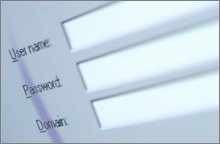|
|

|

How to Create the Best Passwords:
Prevent Password Theft and Loss with These 11
PasswordCreation & Organization Tips
by www.SixWise.com It used to be that if you could remember your phone number
and address, you'd pretty much be OK. Not so today. On top
of an address and phone number (one for work, home and cell),
most of us are inundated with complex online passwords necessary
for everything from e-mail to paying bills to reading the
news.
|

Most adults have at least 10 password-protected accounts
online (and some of us have 20 or more).
|
In fact, the majority of Internet users (62 percent) have
up to 10 online accounts that are password-protected, and
some of us (23) percent have 20 or more, according to a survey
by UK-based anti-virus firm Kaspersky Lab.
Do You Use the Same Password for Everything?
Maybe you have been tempted to simplify things and just use
the same password for everything. It's understandable, after
all, because who can remember that many unique passwords?
According to the Kaspersky Lab survey, about 51 percent of
people use this technique and choose between one and four
passwords to access all of their accounts.
However, not diversifying your passwords puts you at major
risk of identity
theft. If criminals find out your password, they can easily
access your bank accounts, your credit card information --
even apply for a mortgage in your name.
And according to the Carnegie Mellon University's Computer
Emergency Response Team/Coordination Center, up to 80 percent
of problems with computer security are the result of bad passwords.
How Does Password Theft Happen?
There are several ways that hackers can gain access to your
passwords, including:
-
Guessing them: Many passwords, such as sequences
(1234), login names, your birthday, name or social security
number, child's name, pet's name, etc., are easy to guess
(particularly if you've shared this information with someone
in an online chat room). Criminals also use sophisticated
software programs that can guess thousands of potential
passwords in just a few minutes.
-
Phishing
scams: A phony e-mail or pop-up message that tricks
you into divulging personal information, including your
passwords.
-
Online storage: Thieves can sometimes find passwords
stored online, which is why you should avoid using online
storage.
-
Keystroke logging devices: Criminals can easily
attach a keystroke logging device to a public computer
(in a library, Internet café, computer lab, etc.)
that will allow them to see everything you've typed, including
your passwords.
Creating and Protecting a Strong Password
|

A safe password should be eight or more characters
long and include a mix of uppercase and lowercase letters,
numbers and symbols (such as opT9*#Mew).
|
Because a password is often all that stands between your
personal information and a potential thief, it is imperative
that you choose a good one. Here are 11 tips to create secure
passwords (and how to remember them):
-
Make it at least eight characters long. Anything
shorter can be hacked in a matter of minutes to less than
two days. The best passwords, according to Microsoft,
are those that are 14 characters or more (they say a 15-character
password is 33,000 times more secure than an eight-character
one).
-
Use numbers, letters and symbols. A combination
of things (hoi*&l390) is exponentially more secure
than a password with just letters (if the program won't
allow symbols in the password, at least use letters and
numbers).
-
Use a phrase. If the program allows it, use an
entire phrase rather than just one word (such as "My
uncle lives in Toledo, Ohio.").
-
Convert a phrase to a password. Microsoft recommends
thinking of a sentence, then using the first character
of each word to make the password (so for the phrase "My
uncle lives in Toledo, Ohio," the password would
be mulito), then adding in even more complexity with numbers
and symbols (such as $muLitO96).
-
Add uppercase and lowercase letters. Making some
letters in your password uppercase and others lowercase
(mUlitO) will make the password much harder to break.
-
Avoid using words or phrases that people know about
you. The easiest passwords to hack are those that
include personal information, such as your name, family's
names, birthdates, address, license plate, etc. In fact,
just about any word in a dictionary is vulnerable to criminals
who use password-guessing tools.
-
Don't use sequences or repeats. Passwords such
as "56789" or "rrrrrr" are very easy
for criminals to guess.
-
Change your password regularly. While longer
passwords (14 characters) that use symbols and other variations
only need to be changed once every few years, shorter
ones should be changed weekly, according to Microsoft.
-
Don't give out your passwords. Keep them private,
even from friends, coworkers and children, and never reveal
your password in an e-mail or Web page an e-mail directs
you to.
-
Don't type your passwords on public computers.
This leaves them vulnerable to keystroke logging devices.
-
If you can't memorize them, write your passwords
down in a safe place. If you must write down a password
to remember it, do! It's much safer to use a complex password
that you must write down than to use a simple one that
you remember. A relatively safe place to keep your passwords
is on a piece of paper (not on your computer or other
online storage place) that you keep in a secure spot (not
your wallet or purse).
Alternatively, if you'd rather not keep your passwords on
paper, there are software programs such as RoboForm that will
create (with anywhere from one to over 500 characters), memorize
and encrypt passwords for you, then automatically log you
in online.
Recommended Reading
Don't
Get Caught by Phishing Scams on the Internet!
The
Dark Side of Social Online Sites Like MySpace to Beware Of:
Threats to Privacy & Self
Sources
Microsoft.com
ITPro
SunJournal.com
To get more information about this and other highly important topics, sign up for your free subscription to our weekly SixWise.com "Be Safe, Live Long & Prosper" e-newsletter.
With every issue of the free SixWise.com newsletter, you’ll get access to the insights, products, services, and more that can truly improve your well-being, peace of mind, and therefore your life!
|
|
|
|